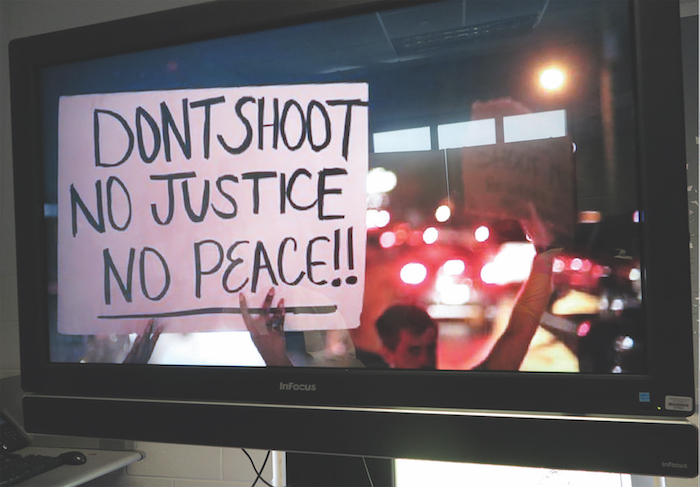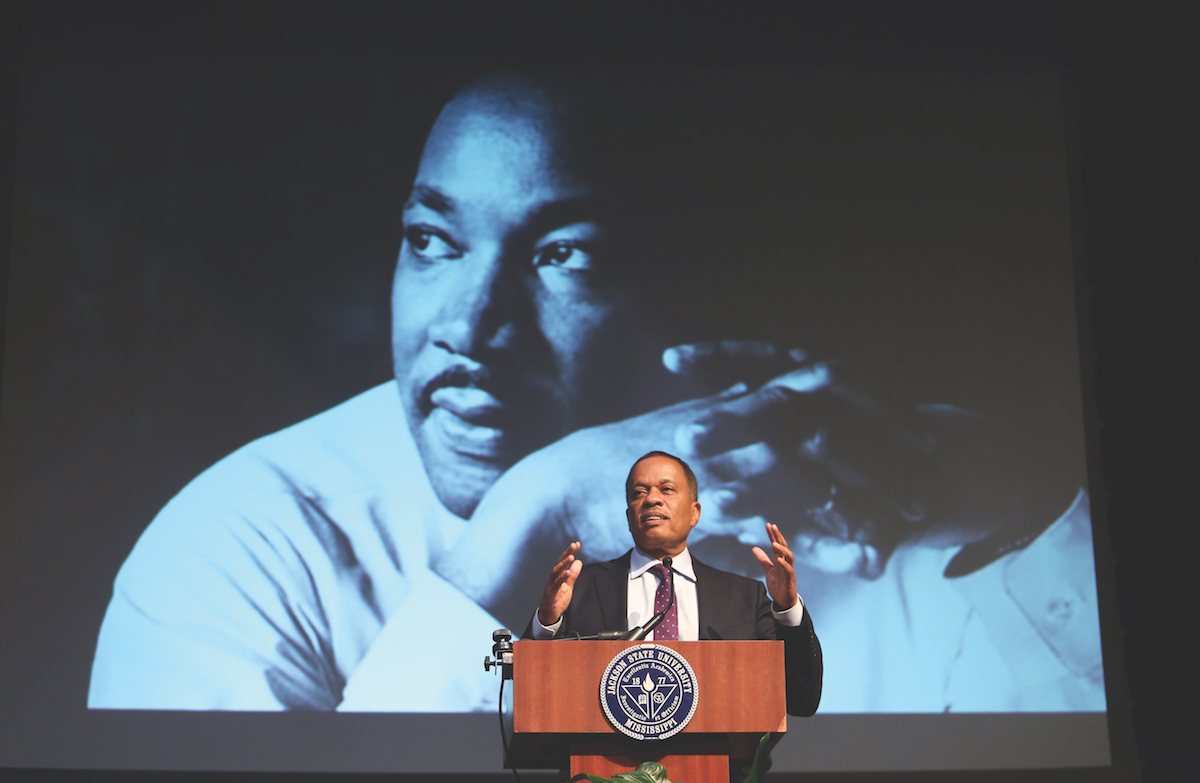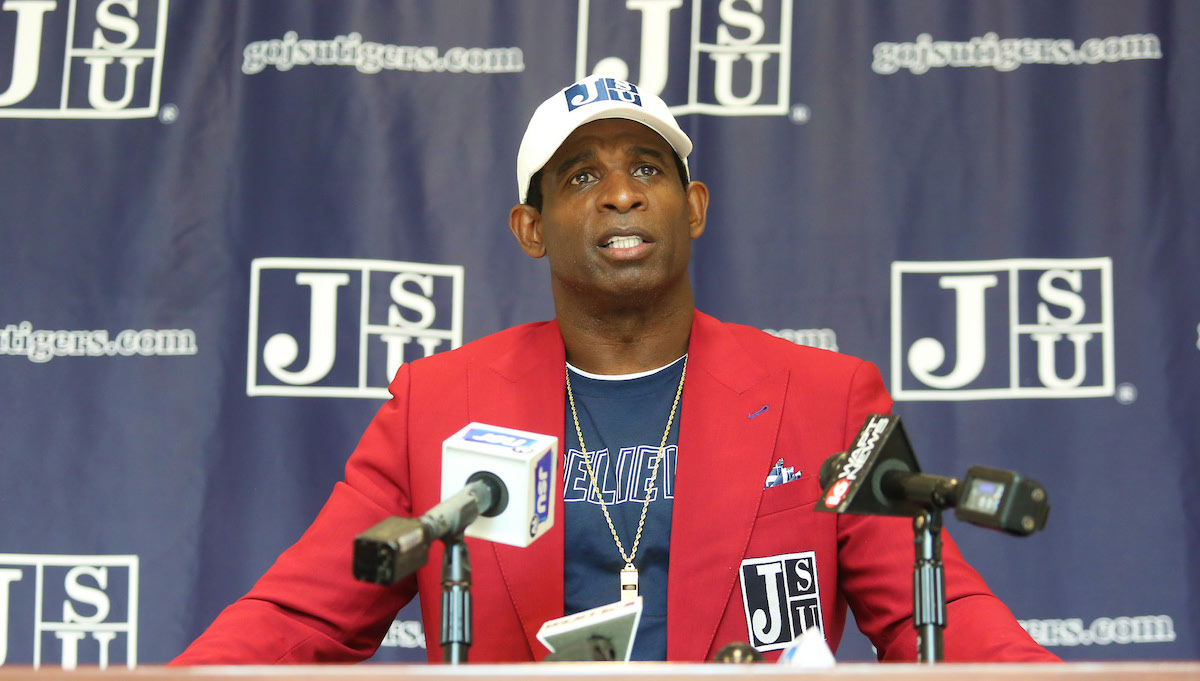[vc_row type=”” top_margin=”none”][vc_column type=”” top_margin=”none” width=”1/1″][vc_raw_html]JTNDaWZyYW1lJTIwaWQlM0QlMjJsc2VtYmVkXzE0NjQxMjE1MjklMjIlMjBzcmMlM0QlMjIlMkYlMkZsaXZlc3RyZWFtLmNvbSUyRmFjY291bnRzJTJGODUxMjIlMkZldmVudHMlMkY0NjkxMjUyJTJGdmlkZW9zJTJGMTIzOTczNDA3JTJGcGxheWVyJTNGd2lkdGglM0Q2NDAlMjZoZWlnaHQlM0QzNjAlMjZhdXRvUGxheSUzRGZhbHNlJTI2bXV0ZSUzRGZhbHNlJTIyJTIwd2lkdGglM0QlMjI2NDAlMjIlMjBoZWlnaHQlM0QlMjIzNjAlMjIlMjBmcmFtZWJvcmRlciUzRCUyMjAlMjIlMjBzY3JvbGxpbmclM0QlMjJubyUyMiUzRSUzQyUyRmlmcmFtZSUzRSUwQSUzQ3NjcmlwdCUyMHR5cGUlM0QlMjJ0ZXh0JTJGamF2YXNjcmlwdCUyMiUyMGRhdGEtZW1iZWRfaWQlM0QlMjJsc2VtYmVkXzE0NjQxMjE1MjklMjIlMjBzcmMlM0QlMjIlMkYlMkZsaXZlc3RyZWFtLmNvbSUyRmFzc2V0cyUyRnBsdWdpbnMlMkZyZWZlcnJlcl90cmFja2luZy5qcyUyMiUzRSUzQyUyRnNjcmlwdCUzRQ==[/vc_raw_html][/vc_column][/vc_row][vc_row][vc_column][vc_column_text]
by L. A. Warren
With his eyes still on the prize and using reflections from his best-selling book of the same name, national journalist and author Juan Williams gave a riveting speech at the 48th Annual Martin Luther King Jr. Birthday Convocation at Jackson State University in January.
“I walk in faith, and I believe Dr. King is alive. I feel (him) every day in my life,” said the Emmy Award-winning political analyst for Fox News and contributor to numerous publications, including the New York Times. Williams’ address focused on historical events and people who shaped the country’s civil rights movement.
Martyred civil rights legend
The event was sponsored by JSU’s Margaret Walker Center and was a prelude to the national MLK holiday celebrating the legacy of the martyred civil rights legend. Williams, who has interviewed Presidents Barack Obama, George H.W. Bush, George W. Bush, Bill Clinton and Ronald Reagan, said references to his acclaimed “Eyes on the Prize: America’s Civil Rights Years, 1954-1965” (Penguin Books) continues to surprise him today because “people always come back to the book.”
Williams said the response to the book has “opened my mind to the idea of a talking book that’s constantly in conversation, not just in my head, but conversation with the readers, conversation with current events and conversation in terms of ongoing racial controversies in our country.”
Dr. Robert Luckett, director of the Margaret Walker Center, agreed. “As a civil rights historian here at Jackson State, the book keeps talking to me, too. My work and own scholarship owe much to and stand on the shoulders of “Eyes on the Prize.” I will be using it this very semester as a touchstone for my students in my civil rights class. It will open channels of conversation for those students, and it will represent a living history.”
Williams said he recently discovered a copy of his book had found a home in the White House library. In addition, while working as a correspondent for the Washington Post in South Africa covering Nelson Mandela’s release from prison, the book helped him to get an interview with the future president of that nation because Mandela had read “Eyes on the Prize,” which was published in 1987.
“So, this book is alive for me as the author,” Williams said. “It’s alive in terms of today’s conversations about race in America – new developments and controversies, election of the first African-American president, tragedies, shootings of Tamir Rice, Michael Brown, even disputes about history. Remember the time (the film) “Selma” came out and the controversies about how President (Lyndon B.) Johnson was depicted. In every case, people come back to the book – the history, the starting point for understanding the thinking and finding common ground about race in America today. Sometimes, it gets personal and uncomfortable.”
The journalist told students that “this book is opening channels for you to have conversations to see what’s real and understand what you bring to the story, what you bring to the book and your preconceptions.” Williams dismissed the notion that the civil rights movement is over and that we are post-racial. “I don’t think so. … We have people talking about ‘I can’t breathe.’ ” He said the conversation moves from black lives matter to all lives matter.
By living history, Williams said we learn that King is helping to “shape, influence and inspire us as we deal with the ongoing history of race in America.”
[/vc_column_text][/vc_column][/vc_row]













Leave a Reply